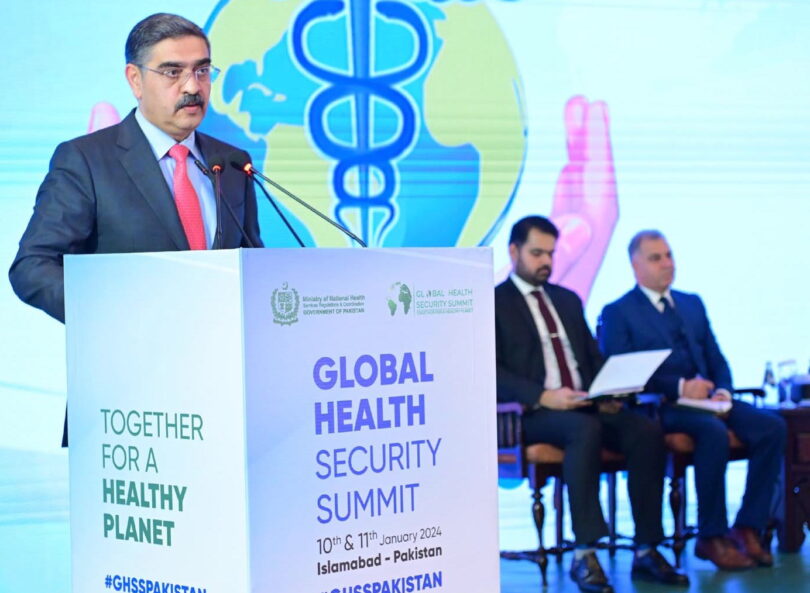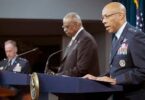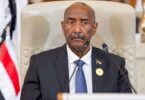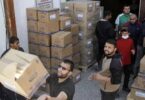F.P. Report
ISLAMABAD: Caretaker Prime Minister Anwaar-ul-Haq Kakar on Wednesday stressed the need to explore mechanisms for global funding that could support nations in need, ensuring that no one was left behind, in the global pursuit of health security.
“The call for a sufficiently funded, widely supported country medium-term road-map, as highlighted in the International Health Regulations Core Capacities evaluation, resonates globally. We must invest in open, transparent, and multi-sectoral processes to strengthen buy-in and commitment at all levels,” the prime minister said while addressing the inaugural session of the first-ever two-day Global Health Security Summit 2024.
Highlighting the importance of enhancing coordination in the health sector beyond borders, Prime Minister Kakar said “One Health” approach, recognized the interconnectedness of human, animal, and environmental health. “Our commitment should extend to establishing global frameworks that facilitate information sharing, joint research, and collaborative strategies for an effective response during emergencies.”
He stressed the need for a strong, visible, active surveillance and tiered public health laboratory system that was integral to early detection, response, and mitigation. He also called for collaboratively working towards establishing international standards for food safety, harmonizing regulations to ensure the highest level of protection for populations worldwide.
“A cross-sectoral approach to managing antimicrobial resistance requires international collaboration,” he said adding “We need a unified front against antimicrobial resistance, with coordinated efforts to develop and enforce global standards for the responsible use of antibiotics and infection prevention,” he remarked. Highlighting the need of collective response to address external and internal health challenge, he said no state in the world could meet the health challenges all alone. Likewise, he said the internal challenges posed by population growth, rapid urbanization and climate change could not be dealt with by a country alone.
“New diseases, like COVID-19 and climate-induced incidents such as the historic floods of 2022 in Pakistan, are disrupting our citizens’ health and causing social and economic impacts. While the developed world has systems in place to timely respond to such health emergencies, a similar ideal system is lacking in the developing world as health systems are relatively weak,” he added. The prime minister said the COVID-19 pandemic had taught us invaluable lessons about the importance of collaboration, preparedness, and a unified response. “It is in this spirit that we convene today, not merely as representatives of our respective countries, but as overseers of global health security.”
He called for establishing a shared vision of the world where health security was not a privilege but a universal right and where the strength of a nation’s health systems was measured not only by its capacity to respond to crises but also by its ability to prevent, detect, and mitigate health threats. “In pursuit of this vision, we must recognize that health security extends beyond the realm of traditional healthcare. It encompasses multi-spectral collaboration, as highlighted in the “Joint External Evaluation of International Health Regulations Core Capacities,” where the interplay of health, environment, agriculture, and security is crucial. Our collective vision is not just about reacting to crises but forging a proactive, precipitated and interconnected global health ecosystem.”
As regards the challenge of climate change, the prime minister said the global Climate Risk Index identifies Pakistan as the eighth most vulnerable country to the impacts of climate change. “As echoed in the “Framework for Climate Resilient Health Systems Pakistan”, we must integrate climate resilience into our health policies and systems. This is not a challenge confined to borders; it is a shared responsibility that necessitates a collective response,” he added. He said the cost of climate injustice in Pakistan was 33 million affected population, 17,000 deaths, and economic loss of more than 30 billion USD. The prime minister hoped that the Summit would mark a huge moment in the journey of global progress towards a healthier world besides ensuring a future where health is truly a global asset. He also appreciated Minister for National Health Services Dr. Nadeem Jan and his ministry for tireless efforts to organize the event successfully.
Caretaker Foreign Minister Jalil Abbas Jilani said the summit was a timely initiative which would help ensure a safer and healthier world for future generations. He said the COVID-19 pandemic that incurred loss of 3.5 million lives and US$ 12.5 trillion across the globe, ruthlessly exposed the vulnerability of global health security. He said Pakistan continued to collaborate with the World Health Organization (WHO) and other international entities in shaping global health policies. He said international cooperation was required to make the health sector more resilient. Health Minister Dr Nadeem Jan said the summit, aimed at collaborating with global leaders to ensure equity-based pandemic preparedness financing for low and middle-income countries and mutual exchange of knowledge and rich experience with member states and experts around summit thematic areas which focuses on vaccine equity, patent deregulation and transfer of technology.
He said the ongoing global health challenges had highlighted the significance of working together, exchanging information, and taking united action. He said this summit provided a forum to combine our knowledge, exchange perspectives, and establish the partnership that go beyond international boundaries.
Ambassador of the United States to Pakistan Donald Bloom said the US was helping the developing nations to improve their health systems and enabled them effectively responding to future outbreaks. Deputy Health Minister of Saudi Arabia, Dr Hani Jokhdar said his country believed in importance of the global health security. Besides, he also acknowledged the significance of pandemic fund. Afghanistan Minister for Public Health Dr Qalandar Ebad said the developing nations needed the international cooperation in health sector as they were not able to tackle the infectious diseases such as Malaria, TB, and HIV Aids alone. He said both Pakistan and Afghanistan were facing the challenge of the polio disease. He said these infectious diseases could challenge global health security. Heads of delegations from Turkiye, Kyrgyzstan and Tajikistan also spoke on the occasion.
PM vows to continue anti-polio mission till its complete eradication: Caretaker Prime Minister Anwaar-ul-Haq Kakar vowed to continue the anti-polio mission of the government till the complete eradication of the crippling disease. The prime minister expressed these views while chairing a meeting of the federal cabinet here at the PM House.
The meeting offered fateha for the security officials protecting the polio eradication team who were martyred in a terrorist incident in Bajaur. PM Kakar paid tribute to the martyred personnel and said the State would not forget their invaluable sacrifice for the homeland. He said the officials sacrificed their lives for the safety of future generations. He said the terrorists could not deter the resolve of the nation to fight polio.







